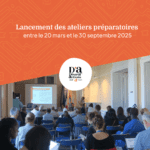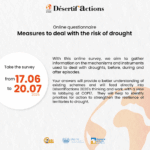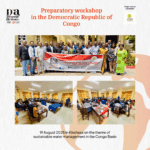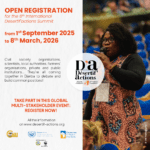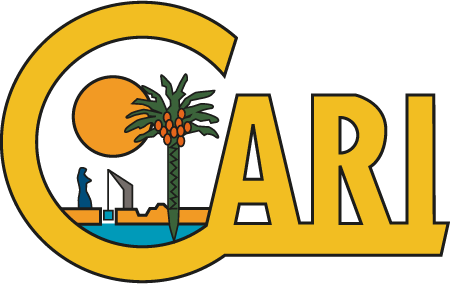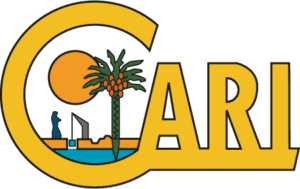News of 05/03/2025

Since 2006, CARI has been organising the Désertif’actions multi-stakeholder summit, a flagship event bringing together civil society, research bodies, national and international institutions, local authorities and the private sector.
The aim of the International Summit is to promote dialogue, clarify the issues at stake and influence international decisions on sustainable land management. The 3-day event will feature debates, thematic workshops, plenary sessions and discussion forums. The summit concludes with a day for the general public.
The international Desertif’actions summit returns in 2026!
For its 6ᵉ edition, Désertif’actions will be held from 25 to 28 March 2026 in Djerba (Tunisia), and will be co-organised by CARI, UNCCD and OSS, in partnership also with ACDD (Association Citoyenneté et Développement Durable) and WWF Afrique du Nord.
The world’s drylands account for 41% of the planet’s land area and are home to almost 2 billion people. The soil and climate conditions of the ecosystems and agro-ecosystems in these areas make them particularly sensitive to climate variability and extreme events such as drought. Rural populations, who are heavily dependent on healthy soils and the availability of natural resources, are the first to be affected by the effects of drought and land degradation. Their livelihoods are affected and their living conditions deteriorate, leading to forced displacement, increased food insecurity and poverty.
The aim of Theme 2026 is therefore to provide a constructive response to the following question:
How can we reduce the vulnerability of regions and improve their resilience to drought?
Territorial planning and management, carried out in an inclusive and participatory way, is proving to be a crucial lever for strengthening the resilience of territories in the face of drought. By integrating the need to preserve ecosystems, food security and economic development, this approach makes it possible to restore ecological functions, manage conflicts and secure land and water resources. All these actions are part of a holistic vision that links environmental, social and economic issues, helping to overcome the obstacles to adopting resilient practices.
Against a backdrop of climate disruption, where desertification, land degradation and drought are threatening our ecosystems and local economies, this summit is an opportunity to build collective responses to this urgent situation!
Une année 2026 tournée vers le pastoralisme durable
L’année 2026, désignée par les Nations Unies comme l’Année du Pastoralisme, met en lumière l’importance de ce modèle dans les zones arides et semi-arides. Les systèmes pastoraux, en conciliant préservation des écosystèmes fragiles, développement économique et cohésion sociale, sont des systèmes résilients face aux sécheresses, en grande partie du fait de leur mobilité. Son rôle central sera exploré en amont et lors du sommet, et mettra en avant les enjeux liés à la facilitation de cette mobilité dans un contexte de plus en plus contraignant.
A global approach to drought risk management
Faced with the complex challenges posed by drought, Desertif’actions 2026 proposes a systemic approach: combining local action with a global vision to strengthen the resilience of our territories in the face of drought.
Building on international frameworks such as the UNCCD, the summit aims to :
- Raising the alarm about the acceleration of land degradation.
- Build a case based on concrete and relevant solutions, in order to influence decisions at COP17.
- Sharing experience and scientific knowledge on preventing and mitigating the risks associated with drought.
- Raising public awareness of the issues involved in combating desertification and sustainable land management.
These actions are part of a dynamic of international collaboration that mobilises all players, from civil society to institutions, to transform environmental challenges into opportunities for collective action.
A participative and collaborative process in three phases
Desertif’actions 2026 is more than just a few days of meetings. It is a dynamic that will unfold over 2025 and the first half of 2026, structured in three key stages:
- Phase 1: preparatory phase (January – December 2025) :
preparation of a joint plea by international civil society on the resilience of territories to drought. To achieve this, several activities are planned: organisation of preparatory workshops (March to September 2025), administration of an online questionnaire (June 2025), facilitation of international webinars (November-December 2025), production of notes deciphering the decisions of the last COP (September-December 2025). - Phase 2: The Désertif’actions summit in Djerba (from 25 to 28 March 2026):
a multi-stakeholder meeting open to the world, enabling international civil society to meet and deepen its advocacy.
350 participants will work together to prepare civil society’s contribution to the COP17 negotiations. Drawing on the arguments of the preparatory phase, they will identify the levers for action to bring about changes in public policy and together prepare the advocacy actions to be carried out in the following months. - Phase 3: Participation in COP17 in Mongolia (2026):
civil society spokespersons will take part in the UNCCD’s COP17 in Mongolia in order to influence decision-making in favour of greater regional resilience to drought. Participation will be structured on the basis of an analysis of the forthcoming negotiations, and drawing on a body of common messages co-constructed with existing networks and the CSO panel. The challenge is to maximise the impact in all the COP dialogue forums.
To find out more about the background and objectives of this initiative, consult the information note available on Desertif’actions 2026
Join us on this collective and innovative adventure!
Together, let’s take action now to build drought-resilient regions and preserve our common future.
